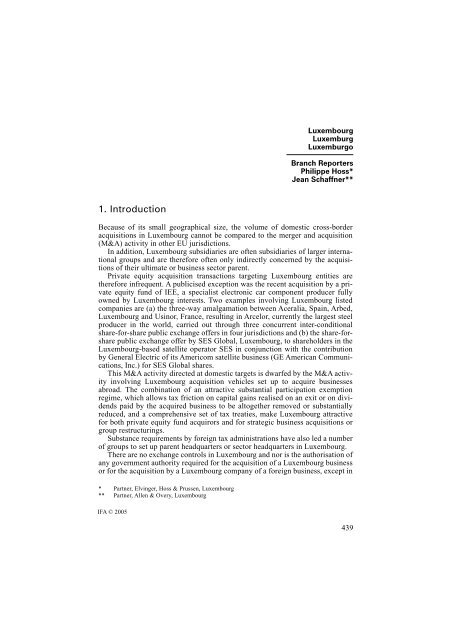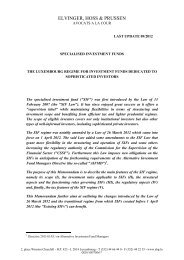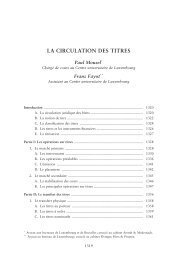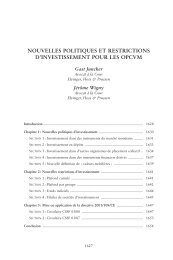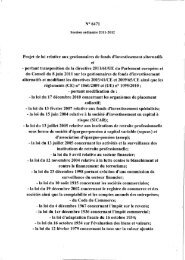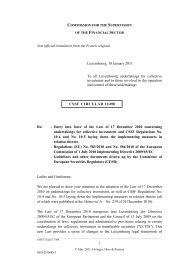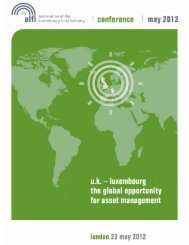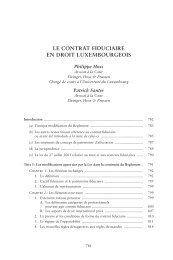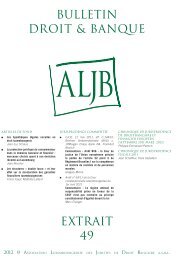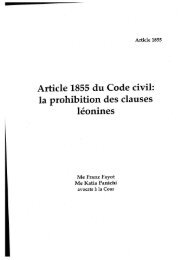1. Introduction - Elvinger, Hoss & Prussen
1. Introduction - Elvinger, Hoss & Prussen
1. Introduction - Elvinger, Hoss & Prussen
- No tags were found...
Create successful ePaper yourself
Turn your PDF publications into a flip-book with our unique Google optimized e-Paper software.
LuxembourgLuxemburgLuxemburgoBranch ReportersPhilippe <strong>Hoss</strong>*Jean Schaffner**<strong>1.</strong> <strong>Introduction</strong>Because of its small geographical size, the volume of domestic cross-borderacquisitions in Luxembourg cannot be compared to the merger and acquisition(M&A) activity in other EU jurisdictions.In addition, Luxembourg subsidiaries are often subsidiaries of larger internationalgroups and are therefore often only indirectly concerned by the acquisitionsof their ultimate or business sector parent.Private equity acquisition transactions targeting Luxembourg entities aretherefore infrequent. A publicised exception was the recent acquisition by a privateequity fund of IEE, a specialist electronic car component producer fullyowned by Luxembourg interests. Two examples involving Luxembourg listedcompanies are (a) the three-way amalgamation between Aceralia, Spain, Arbed,Luxembourg and Usinor, France, resulting in Arcelor, currently the largest steelproducer in the world, carried out through three concurrent inter-conditionalshare-for-share public exchange offers in four jurisdictions and (b) the share-forsharepublic exchange offer by SES Global, Luxembourg, to shareholders in theLuxembourg-based satellite operator SES in conjunction with the contributionby General Electric of its Americom satellite business (GE American Communications,Inc.) for SES Global shares.This M&A activity directed at domestic targets is dwarfed by the M&A activityinvolving Luxembourg acquisition vehicles set up to acquire businessesabroad. The combination of an attractive substantial participation exemptionregime, which allows tax friction on capital gains realised on an exit or on dividendspaid by the acquired business to be altogether removed or substantiallyreduced, and a comprehensive set of tax treaties, make Luxembourg attractivefor both private equity fund acquirors and for strategic business acquisitions orgroup restructurings.Substance requirements by foreign tax administrations have also led a numberof groups to set up parent headquarters or sector headquarters in Luxembourg.There are no exchange controls in Luxembourg and nor is the authorisation ofany government authority required for the acquisition of a Luxembourg businessor for the acquisition by a Luxembourg company of a foreign business, except in* Partner, <strong>Elvinger</strong>, <strong>Hoss</strong> & <strong>Prussen</strong>, Luxembourg** Partner, Allen & Overy, LuxembourgIFA © 2005439
LUXEMBOURGregulated sectors such as the banking, insurance and financial sectors generallyas well as in the media sector. Acquisitions may also need clearance by Luxembourgor EU competition authorities.There are no restrictions in Luxembourg from a legal or regulatory perspectiveon the form of consideration to be used in connection with the acquisition ofbusinesses and, in particular, consideration can be in the form of shares or notesor a combination of both whether issued by Luxembourg acquirors to Luxembourgor foreign sellers of the target business or by foreign acquirors to Luxembourgholders of a Luxembourg business. In circumstances where the acquisitiontakes the form of a public offer and where the consideration is in the form ofsecurities, Luxembourg public offer rules will apply.2. Summary of key tax principles2.<strong>1.</strong> Tax and capital gains – generalThere is no specific Luxembourg tax on capital gains but unless certain exemptionsor deferrals are available, any capital gain realised by a business person ora commercial company resident in Luxembourg is subject to Luxembourgincome or corporate income tax and will have to be included in its taxable profit.In the case of foreign business persons or companies which have a permanentestablishment (PE) in Luxembourg, any capital gains realised on the sale ofassets connected to this PE will have to be included in the taxable profit of theLuxembourg PE (article 156 LIR – Luxembourg income tax law of 4 December1967, as amended).Luxembourg corporations and PEs of non-resident corporations will be subjectto a combined rate of corporate income tax, municipal tax on income and solidaritysurcharge amounting to an aggregate rate of 30.38 per cent.2.2. Sale of shares2.2.<strong>1.</strong> Substantial participation exemptionLuxembourg tax law provides for a tax exemption from capital gains on the saleof certain qualifying participations. The exemption is commonly known as thesubstantial participation exemption (privilège mère–fille, Schachtelprivileg). Theexemption is only available to the following sellers:• fully taxable resident corporations (sociétés de capitaux). Types of residentcompanies which constitute corporations for these purposes are the publiclimited companies (sociétés anoymes), corporate partnerships limited byshares (sociétés en commandite par actions) and limited companies (sociétésà responsabilité limitée);• Luxembourg PEs of companies resident in a Member State of the EuropeanUnion and referred to by article 2 of the EC Directive of 23 July 1990 concerningthe common fiscal regime applicable to parent companies and subsidiariesof different Member States (90/435/EEC);440
HOSS, SCHAFFNER• a Luxembourg PE of a corporation which is a resident of a state with whichLuxembourg has a tax treaty.The exemption is only available for a sale of a participation in the share capitalof:• a resident fully taxable corporation;• a company which is a resident of an EU Member State and is referred to inarticle 2 of EC Directive 90/435/EEC; or• a non-resident fully taxable corporation which is subject to a tax comparableto Luxembourg corporate income tax.The law does not define which criteria a foreign tax must fulfil in order to be consideredcomparable to Luxembourg corporate income tax and there are no courtrulings on the subject.The current interpretation of the Luxembourg tax administration is that it mustbe a tax payable to a state, or in the case of a federal state, to either the federalgovernment or the relevant state government, on the basis of valuation principleswhich are comparable to those of Luxembourg tax law and where the applicablerate exceeds 11 per cent, which is half the Luxembourg corporate income tax rate.The holding of the participation in any of the eligible resident or non-residentcompanies must not necessarily be a direct participation but may be held indirectlythrough entities which are transparent from a tax point of view and whichare listed in paragraph (1) of article 175 LIR, namely unlimited companies(sociétés en nom collectif), limited partnerships (sociétés en commandite simple),economic interest groupings, European economic interest groupings and sociétésciviles (civil, i.e. non-commercial companies). In such cases, however, theamount of the participation will be deemed to be in proportion to the fractionheld by the seller in the net invested assets of the tax-transparent entity.In order to be exempt, the minimum level of the participation must representat least 10 per cent of the share capital of the target or the acquisition pricethereof must have been at least 6,000,000 euro. In addition, the seller must, onthe date of sale, have held the participation or must undertake to continue to holdthe participation for a period of at least 12 months and during that entire period,the level of the participation held will need to continue to meet either the 10 percent threshold or have a minimum acquisition price of 6,000,000 euro. It willtherefore be possible to realise an exempt capital gain in the short term (i.e.within less than 12 months after acquisition) on the condition that the remainingparticipation held exceeds one of these two thresholds.In four sets of circumstances, all or part of the capital gains which would otherwisebe exempt under the substantial participation regime may neverthelesshave to be included in the taxable profit of the seller.The first such case is where the seller has during the fiscal year of the sale orin prior fiscal years reduced its taxable income through the recognition of operatingor financing costs arising in relation to the exempt participation.A second case is where the value of the sold participation has been previouslyreduced in the balance sheet of the seller and thereby resulted in a reduction intaxable income. The portion of the capital gains corresponding to that deductionwill not benefit from the exemption. As a result, the capital gains exemption isonly available on the difference between the sale price and the historic acquisitionprice.441
LUXEMBOURGA third limitation exists if the sold exempted participation resulted from thereinvestment of the proceeds of a sale of a non-exempted participation whichbenefited from a deferral of tax on capital gains (see section 2.3.3 below). In thiscase the capital gains realised at the time of the first sale (and which were notsubject to tax at the time) will not benefit from the participation exemption; however,it may again be deferred under the conditions set out in article 54 LIR.A final exception exists where the substantial participation sold had beenacquired in exchange for a non-qualifying participation, inter alia as a result ofa merger or a demerger resulting in an exchange of shares or in a share-forshareexchange where the seller received the shares now being disposed of.However, this exception is only applicable in the first five years after the initialexchange.2.2.2. Tax deferralIf the conditions for the substantial participation exemption are not fulfilled, anycapital gains realised on the sale of shares will be included in the taxable profit ofthe seller unless the conditions for deferral provided for by article 54 LIR are fulfilled(see under section 2.3.3).2.2.3. Non-residentsSubject to treaty provisions, capital gains on the sale of shares in Luxembourgcompanies by non-residents (where the shares are not connected to a LuxembourgPE of the non-resident) can be subject to Luxembourg tax in the followingcircumstances. Non-residents will not be subject to Luxembourg tax on capitalgains realised on the sale of shares in a Luxembourg company unless the non-residentshareholder has held a substantial participation within the meaning of article100 LIR (essentially 10 per cent of the share capital) and the sale occurswithin six months of the acquisition of the shares. Furthermore, certain non-residentswho were formerly Luxembourg residents and who held a substantial participationas defined in article 100 LIR will also be subject to tax on capital gainseven if the sale occurs more than six months after the acquisition.2.3. Sale of business assetsAs indicated above, capital gains on the sale of assets by a company are subjectto corporation tax at the full rate of 30.38 per cent. The form of the consideration(cash or in kind) is irrelevant. There are neither particular abatements, nor areduced rate available on the sale of certain assets, depending for example on theobservation of a particular holding period. There is, however, an exception to thisgeneral taxation for capital gains on substantial shareholdings, benefiting fromthe substantial participation exemption (see section 2.2 above).Assets are also deemed disposed of at the time of the liquidation of the Luxembourgcompany, at the time of the conversion of a corporation into a tax-transparentpartnership or at the time when the owner transfers its tax residenceabroad or transfers an asset to a foreign PE. The reference value for the calculationof the capital gains at the time of liquidation is given by the estimated trans-442
fer value (valeur estimée de réalisation), which is the fair market value of theseassets. This value may be opposed to the going concern value of an asset (valeurd’exploitation), corresponding to the value conferred to an asset in the case ofdisposal of the whole enterprise as a going concern, i.e. with a view its activitiesbeing continued.We have addressed in this section various techniques to reduce the tax basis onthe sale of business assets or to obtain a tax deferral.2.3.<strong>1.</strong> Liquidation of a companyA company which disposes of an asset in the course of its liquidation may reappraisethe acquisition value of this asset to take into account monetary erosion.This results, in practice, in an increase of the acquisition value of the asset sold,depending on the year of acquisition and the inflation rate between the year ofacquisition and the year of disposal. This reappraisal is, however, partially compensatedby a corresponding adjustment of the amortisation deducted from thegross acquisition value of the asset in the past.2.3.2. Tax consolidationThere are no particular rules in relation to asset transfers within a tax consolidatedgroup (see section 2.9 below).2.3.3. Tax deferral upon reinvestment of sale proceedsLuxembourg tax law provides also for the possibility of deferring taxation inthe case of a disposal of real estate or of business assets which may not bedepreciated. In substance, the capital gains realised on the disposal of suchassets will not be subject to taxation on condition that the whole sale price isreinvested in the acquisition of another fixed asset at the latest at the end of thesecond year following the year of disposal. If the asset acquired as a reinvestmentof the sale price is a fixed asset other than a participation, the acquisitionvalue of the new asset will for the purpose of the tax balance sheet be reducedby an amount corresponding to the capital gain whose taxation has beendeferred. If this asset is a participation, the participation will be recorded for itsactual acquisition value and a corresponding reserve has to be booked in acompany’s balance sheet. Basically, this rule is intended to avoid the deferredcapital gains being exempt at the latter stage by application of the participationexemption.2.3.4. Transfers of assets against sharesHOSS, SCHAFFNERArticle 59bis LIR regulates the tax neutrality of the contribution of a business orof an autonomous part of a business by a Luxembourg corporation to a LuxembourgPE of an EU company, as well as the contribution by a Luxembourg corporationof a PE located in another EU Member State to a company residing inanother EU Member State, where the Luxembourg transferee (rather than itsshareholders) receives shares in the acquiror as considersation. Article 59bis LIR443
LUXEMBOURGis drafted in a way similar to article 59 LIR, which provides for tax neutrality ofpure domestic transfers of businesses.The benefit of the tax neutrality (or more correct tax deferral) provided by article59bis LIR does not apply where the non-resident beneficiary of the transfer isa company outside the EU.If the beneficiary of the transfer continues the accounting values of the transferredassets previously used by the transferor, the transferor need not disclose acapital gain on the transfer, and the assets transferred are deemed to have beenacquired by the beneficiary at the date they were initially acquired by the transferorand for the same value, thus offering a tax deferral. The reference to the initialacquisition date is, for example, of interest in the case where the assetstransferred include participations for which the participation exemption may beclaimed (see 2.2.1). For transfer of assets involving a non-resident and within thescope of article 59bis LIR, the same rule applies.Under article 59bis LIR, the Luxembourg transferor may not for tax purposestake into account a value of the transferred assets which is lower than the transfervalue recorded by the transferee. In other words, if the transferee records a transfervalue which is in excess of the book value of the assets transferred in the balancesheet of the transferor, the transferor has to disclose a taxable profitcorresponding to this difference. Thus, article 59bis LIR may still result in apotential double taxation, if the transferor and the transferee initially benefit fromthe tax neutrality provided by article 59bis LIR, as, on the one hand, the transfereemay under its tax laws be taxed on a future disposal of the assets by referenceto the book value of the assets previously recorded by the transferor, and thetransferor will be taxed upon disposal of the shares in the transferee received byit in exchange for the transfer, by taking the book value of the assets transferredas a reference for determining its capital gains on the sale of shares. However, thetransferor may benefit from the capital gains participation exemption providedthe conditions for the participation exemption are met (see 2.2.1).If assets are contributed to a Luxembourg beneficiary company by a nonresidentit may value the assets so acquired at any value between the book valueof the transferor and their fair market value (determined in accordance withLuxembourg income tax law), regardless of the value used by the transferor.Thus, Luxembourg tax law is flexible as regards valuations of contributionsto Luxembourg corporations, which may take into account foreign valuationconstraints.If the assets transferred include a PE located in an EU Member State withwhich Luxembourg has not signed a double tax treaty, any capital gains realisedwill be taxable, but will be reduced by the tax which would have been due in theother Member State, in the absence of a tax neutral treatment under the MergerDirective. For purposes of this sale, the PE transferred has to be valued at itsfair market value, regardless of the actual transfer value taken into account fortax purposes. If the PE located in the EU Member State with which no tax treatyhas been signed is in a loss situation, losses which have been deducted from thetaxable profits of the Luxembourg head office in the past, because of the taxationof the Luxembourg company on its worldwide profits in the absence of atax treaty, will be recaptured at the time the PE is contributed.444
2.3.5. Transfer of assets in the course of a mergerIn the case of a merger, the disappearing companies are in principle deemed liquidatedfor tax purposes. This liquidation will trigger the taxation of latent capitalgains and unrealised profits at the level of the disappearing companies.In a domestic merger or cross-border merger where the Luxembourg corporationis the disappearing entity, taxation of any capital gains at the level of the disappearingcorporation may be deferred under certain conditions listed in article170(2) LIR. The transfer of the assets of the disappearing company(ies) must berealised in such way that the shareholders of the disappearing company(ies)receive shares in the acquiring company in exchange for their shares in the disappearingcompany(ies). A balancing cash adjustment (soulte) not exceeding 10per cent of the nominal value of the shares is acceptable. A tax-neutral mergeralso requires that the assets and liabilities of the disappearing company(ies) aretransferred at book value to the absorbing entity. This means that if the absorbingentity sells the assets acquired from the disappearing company(ies) via a mergerat a later stage, the capital gain realised will be computed in view of the bookvalue of these assets at the level of the disappearing company(ies), which mustbe taken over by the absorbing company, and not in view of a revalued fair marketvalue of the assets at the time of the merger. A tax-neutral merger must thusbe realised so that Luxembourg retains the right to tax the deferred gain in thefuture (meaning that usually a PE has to continue in Luxembourg).If the resident surviving corporation has a participation in the disappearingcompany(ies), article 171 LIR provides that the share cancellation resultingfrom the merger will be treated as a disposal of those shares at fair market valuefor tax purposes, despite the fact that the merger as such is effected in a tax-neutralmanner under article 170(2) LIR or 170bis (1) LIR. This deemed gain is,however, tax exempt under the dividend participation exemption where the participationof the absorbing company in the disappearing company(ies) represented10 per cent of the share capital of the disappearing company(ies), or hadan acquisition value of 1,200,000 euro, and has been held for at least twelvemonths prior to the merger (see 2.11 below). The gain realised for tax purposeson the cancellation of the participation in the disappearing company(ies) willalso be tax exempt if the absorbing company has had a participation of 25 percent in the disappearing company(ies), without any minimum holding periodrequirement.The transfer in a merger transaction of PEs located outside of Luxembourg ina treaty country being part of the European Community is exempt if made atbook value in the accounts of the Luxembourg transferor. In the absence of a taxtreaty, Luxembourg retains the right to tax a gain on such transfer of a PE . Acredit mechanism is then available, in a way similar to a transfer of assets if Luxembourghas no tax treaty with the country of location of the PE (see 2.3.4).2.3.6. Transfer of assets in the case of a demergerHOSS, SCHAFFNERThe conditions for a tax-neutral demerger are similar to those applying to amerger. The fiscal definition of “demerger” is broad and includes divisions, i.e.where a company (which will be dissolved in the process) transfers all of its445
LUXEMBOURGassets and liabilities to two or more new or existing companies and where shareholdersexchange their shares in the demerged company for shares in the beneficiarycompanies, and spin-offs and split-offs, i.e. transactions where a companytransfers, without being dissolved, part of its assets to a new or existing companyand its shareholders receive shares in the beneficiary company while remainingshareholders of the demerged company, or where the shareholders receive sharesin the beneficiary company in exchange for their shares in the demerged company.From a company law perspective, currently only a true division is possiblefor sociétés anonymes but a Bill of law is currently pending to provide for thepossibility of spin-offs and split-offs (Bill of law no. 4992).In relation to demergers, the law adds a condition for tax neutrality which doesnot apply to mergers. Article 170(3)2 LIR states that the assets transferred to thetransferees, as well as assets retained by the demerged company, have to includeat least an autonomous part of business. An autonomous part of business in thiscontext basically means a business which may operate on its own, independentlyfrom the rest of the undertaking. In the presence of a true division, where thedemerged public limited company disappears as a consequence of the transaction,this condition should a priori always be met, as a public limited companyby virtue of article 14 LIR always carries on a commercial business, which isdeemed transferred in its entirety in the context of the demerger.Four particular cases need nevertheless to be more carefully considered. Thefirst case concerns a holding company which only holds participations or alternativelya company which both operates a business and holds participations andwhere one or more participations are transferred to one of the new companiesresulting from the division without other business assets. The participation ina subsidiary should in our opinion be recognised as an autonomous part of abusiness, in particular if the demerged company was a holding company or ifthe participation represents a separate business of the demerged company. Thetax administration in charge of capital duty has in the past taken the oppositeposition.The second case exists where the assets contributed to one of the new companiesconsist solely of real estate property, in particular where the operating businessis contributed to the other new company. It has been admitted in the past bythe tax administration that in certain circumstances real estate may constitute anautonomous business.A more problematic case exists where only cash is contributed to one of thenew companies, as it is very likely that cash cannot on its own constitute anautonomous business except in case of the transfer of a deposit-taking business.A final particular case arises where solely a trading portfolio of securities issplit off. In circumstances where the recipient company is or becomes authorisedas a professional of the financial sector dealing in securities for its own account,it will have received these initial assets as a business and such a portfolio of securitiesshould be considered as an autonomous part of the business.2.3.7. Transfer pricing rulesIn the case of the sale of a business asset to a non-resident related party, the Luxembourgtax administration may reassess the transfer value of these assets if a446
transfer value below market results in a shift of taxable profits to the benefit of anon-resident taxpayer, which is linked, directly or indirectly, to the transferor.This is, however, only an application of common transfer pricing rules.If transfer prices are exclusively motivated by a particular relationship a Luxembourgundertaking has with a non-resident taxpayer, and are not based onsound business reasons, the Luxembourg tax administration may reassess theundertaking’s taxable profit (articles 56 and 164 LIR). A shift of profits outsideLuxembourg between related parties, for instance through excessive indebtedness,implying (excessive) deductible expenses, may therefore be challenged onthe grounds of common transfer pricing rules (see section 2.7 below).According to article 164 LIR, a hidden profit distribution arises where a director indirect shareholder receives moneys or other advantages from a companywhich he would not have received in the absence of this capacity. No tax deductionis available at the company level for these expenses. These moneys oradvantages are further treated as a dividend and thus are subject to dividend withholdingtax.There is no specific controlled foreign company legislation in the Luxembourgtax code.2.4. The buyer of sharesThe buyer will need to record the participation acquired in its balance sheet at theacquisition price plus eventually costs connected to the acquisition. If the participationis considered as a fixed financial asset it cannot be amortised. If a nontemporarydepreciation in value occurs, the assets may be written down and thiswrite-down reduces taxable income accordingly. However, where the reasons todepreciate have ceased to exist, the valuation must be rectified up to the acquisitionprice which will in turn increase taxable income.The assets of the company acquired cannot be revalued as a result of theacquisition of its shares.2.5. The buyer of business assetsHOSS, SCHAFFNERThe buyer will record the assets acquired for their true acquisition value, exceptif an adjustment is made by application of transfer pricing rules. The assetsacquired may be depreciated by application of the straight line or the decliningbalance amortisation method, depending on the nature of the relevant assets.If a tax-neutral transfer has been made under Luxembourg rules or those ofanother EU jurisdiction in accordance with the Merger Directive, the issue iswhether the transferee has to take over the transfer values on which the transferorhas relied in its tax return. In order for the transfer to remain tax neutral, the lawrequires in the context of a Luxembourg transfer that the transferee uses the samevalues as the transferor. Thus, if the transferor realises a totally or partially taxneutraltransfer of assets, the transferee may not benefit from a step-up or onlyfrom a partial corresponding step-up in basis for these assets. This mechanism isintended to avoid all, or, as the case may be, part of the capital gains commerciallyrealised at the time of the transfer not being subject to any taxation on afuture disposal.447
LUXEMBOURG2.6. Indirect taxesNo stamp duty or similar duties are payable on the transfer of shares in a Luxembourgcorporation.In the case of a contribution in kind of shares in the target to a Luxembourgacquiring company against the issuance of new shares of the acquiring company(share-for-share exchange), capital duty at the rate of 1 per cent is in principlepayable on the value of the contribution to the acquiring company. An exemptionis available under article 4-2 of the law of 29 December 1971 on capital dutywhere the shares contributed represent at least 65 per cent of the share capital ofthe target and the target is a company with its headquarters or registered office inthe EU. However, the exemption requires that the Luxembourg recipient companykeeps all the share contributed to it and at least a 65 per cent participation inthe target for at least five years. If either of these conditions is not fulfilled, thisexemption from capital duty is subject to a claw-back except where the disposaloccurs within a capital duty exempt transaction or as a result of the liquidation ofthe acquiring company.A capital duty exemption also applies for asset mergers involving Luxembourgor EU entities. Article 4-1 of the law on capital duty provides that, undercertain conditions, transactions where one company contributes all its assets andliabilities to an existing or new company may be exempt from capital duty. Thisprovision in particular applies to mergers and demergers which will thus beexempt from capital duty. No claw-back applies to such asset mergers.The acquisition of a going concern may be realised in a neutral manner forvalue-added tax purposes, where the recipient may be considered as the successorof the transferor, in accordance with the domestic provisions implementingarticle 5(8) and article 6(5) of the Sixth VAT Directive. The sale of individualassets may, however, be subject to VAT by application of common tax principles.Registration duty is due on the transfer of assets if the transfer deed is passedbefore a Luxembourg notary public or recorded in a deed, which is registered inLuxembourg. Such a registration is, however, only compulsory in respect of certainassets such as real estate located in Luxembourg or planes or ships registeredin Luxembourg. The basic rate is 6 per cent, and a higher rate of 7 per cent to 10per cent applies to the transfer of real estate. Several exemptions and lower transferrates are also available, depending on the nature of the assets transferred.2.7. Acquisition financingIf a Luxembourg company is funded with debt in order to finance the acquisitionof shares in a target company, the financing costs are generally deductible for taxpurposes. Financing costs comprise interest but also other costs related to theacquisition debt. The deduction is available irrespective of whether the targetcompany is a Luxembourg company or not.However, any expenses or costs which are economically linked to exemptincome will not be tax deductible. That limitation only applies to the extent thatthe company actually receives exempt income. Any excess of acquisition or othercosts related to the exempt participation over the exempt income received in agiven fiscal year will reduce the taxable base. However, the participation exemp-448
HOSS, SCHAFFNERtion on capital gains (see section 2.2.1) will not apply where costs economicallyconnected to the exempt participation have previously reduced the taxableincome of the company.Where the acquisition financing is provided by direct or indirect shareholdersor where the acquisition financing is provided by third party lenders but with thebenefit of a guarantee or collateral from direct or indirect shareholders, thedeductibility of acquisition financing costs may be affected by thin capitalisationrules. Luxembourg law does not contain specific provisions regarding thin capitalisation.However, the tax administration will analyse whether the provision ofacquisition debt financing by direct or indirect shareholders or guaranteed bysuch shareholders can be requalified as hidden capital contribution.The typical maximum ratio accepted for the financing of participations is acapital/debt ratio of 15:85. If that ratio is not respected, the tax administrationmay not allow the deductibility of interest from profit and recharacterise them asdividends. Any payment of such recharacterised dividends will be subject towithholding tax unless dividend withholding tax exemptions are available. Bycontrast, interest payments are in principle not subject to a withholding.2.8. Losses of the target companyBasically, losses can be carried forward in Luxembourg without limitation by thecompany which has suffered the losses. There is no carry-back available underLuxembourg tax law. The availability of a loss carry-forward is not impeded bythe transfer of the shares of the company which has suffered the losses, unlessthe operation may be deemed abusive. An abuse might, for example, exist whereall the shares of a company are transferred and the business activity of that companyis fundamentally changed subsequently to the transfer.A transfer of losses is, however, not available in the case where only part ofa business is sold or where the company having suffered the losses is liquidated.Further, the tax administration considers that in case of a merger or division,losses of the disappearing company cannot be transferred to the acquiringcompany.As discussed above in section 2.3, there are several possibilities of realising atax-neutral reorganisation of businesses or a merger or demerger under Luxembourglaw. If the transferor company (in the case of a business transfer) orthe disappearing company (in the case of a merger or division) has losses carriedforward, it is possible to disclose part of the gains on the reorganisation toabsorb the losses carried forward. As a consequence, the transferee or the beneficiarycompany may acquire the assets of the transferor or the disappearing companywith a stepped-up basis to benefit in particular from a higher depreciationpossibility.2.9. Group taxationLuxembourg allows groups of domestic companies to opt for a full tax consolidation.Full tax consolidation is available where a resident fully taxable corporationholds at least 95 per cent of the share capital in one or more resident fullytaxable corporations. The participation must be held directly or indirectly. Where449
LUXEMBOURGthe participation is held indirectly, the intermediary companies must also be fullytaxable resident or non-resident corporations. The participation may also be heldthrough a transparent entity referred to in paragraph 1 of article 175 LIR (seesection 2.2.1 above). Full tax consolidation is also available where the residentcompanies are directly or indirectly held by a Luxembourg PE of a non-residentcorporation which is fully subject to a tax corresponding to Luxembourg corporateincome tax.Where the 95 per cent threshold is not met the tax consolidation regime is alsoavailable subject to the consent of the Minister of Finance. In that case the holdingmust be of 75 per cent at least and minority shareholders representing at least75 per cent of the capital not held by the parent or resident PE must agree to thetax consolidation.In a tax consolidation, the taxable results of the members of the consolidatedgroup will be aggregated with those of the head company or Luxembourg PE.The profit or loss of the tax grouping will result from the addition of the individualtaxable results of the companies which are part of the group (and of the taxableresults of the Luxembourg PE if applicable) and any duplication of taxationor deduction will have to be neutralised.The option must be exercised for at least five subsequent fiscal years. Anycarry-forward losses resulting from fiscal years prior to the tax consolidation canbe used by the tax grouping but only to the extent where the company which hassuffered such losses realises a profit. (For a more detailed analysis, see the Luxembourgbranch report in volume 89b, Group Taxation, published on the occasionof the 2004 IFA Vienna Congress.)2.10. Post-acquisition integrationWithin the context of a domestic group of companies, an alternative to tax consolidationwould consist of the amalgamation of the buyer and the target, whichcan be structured so that it remains tax neutral (see 2.3.6).An amalgamation of a Luxembourg buyer with its purchased foreign targetwill take the form either of a cross-border merger or of a liquidation of the foreigntarget with in both cases transfer of the business of the foreign target to anexisting PE of the Luxembourg acquirer or to a PE created at that time.In the case of an international merger with the Luxembourg corporation beingthe surviving company, the Luxembourg corporation may value the transmittedassets either at the book value of the disappearing company or at a value comprisedbetween the book value of the disappearing company and the fair marketvalue of the assets (article 170ter LIR). The principle of this rule is identical tothe rule applying in case of contribution of assets against shares discussed in section2.3.4 above.The same rule applies if the foreign target is the subject of a division with anautonomous part of its business being contributed to the Luxembourg acquirer.If the Luxembourg corporation has held more than 25 per cent of the sharecapital of the disappearing company or meets the conditions of the dividend substantialparticipation exemption, any deemed tax gain realised on the value ofthat participation in the disappearing company is exempt from tax under article171(3) LIR.450
Where the transaction takes the form of a liquidation of the foreign subsidiary(which may be unattractive under the relevant foreign tax laws if such a liquidationresults in all unrealised capital gains being subject to tax) the assets distributedto the Luxembourg parent will be from a Luxembourg point of viewconsidered as a dividend. If the conditions of the dividend substantial participationexemption are fulfilled (see 2.11 below) any excess of the value of assetsreceived over the book value of the participation in the balance sheet of the Luxembourgparent will be exempt.A cross-border true merger with the Luxembourg company being the disappearingcompany is at present not provided for by company law and generallyconsidered as not being possible from that point of view.The case is nevertheless dealt with from a tax point of view by article 170bisLIR if the merger is with a company resident in the European Union. Such a transactionwill be tax exempt if the foreign beneficiary company reflects the assetsacquired as at the same book value as the disappearing company. As a result, Luxembourgwill retain the possibility to tax at a later stage as in principle the businessof the disappearing company would be lodged in a Luxembourg PE of the foreignacquirer. The maintaining of historic book values will also allow the benefit of previoustax deferrals to be preserved (see section 2.3.3. above). If the business of theLuxembourg disappearing company includes a PE located in another EuropeanUnion Member State, the transfer thereof can also be made at book value for taxpurposes unless the location of the PE is in a Member State with which Luxembourghas no double tax treaty (see 2.3.4). Currently Luxembourg has double taxtreaties with all EU Member States except Cyprus, Estonia, Latvia and Lithuania.The liquidation of the Luxembourg target will give rise to taxation of all unrealisedand all previously deferred capital gains in the liquidated company exceptin case of assets to which the substantial capital gains participation exemptionapplies. Payment of liquidation proceeds by the Luxembourg company will notbe subject to any withholding tax.2.1<strong>1.</strong> Taxation of dividendsHOSS, SCHAFFNERIn principle any dividend paid by a Luxembourg corporation to another Luxembourgcorporation will be subject to a withholding tax at 20 per cent.Article 147 LIR provides for a general exemption from withholding tax fordividends paid by a fully taxable resident corporation where the dividend is paidon a qualifying participation to:• another fully taxable resident corporation;• a company which is a resident of a Member State of the European Union andreferred to in article 2 of the Parent–Subsidiary Directive 90/435/EEC; or• a Luxembourg PE of a company which is a resident of another MemberState of the EU and referred to in Directive 90/435/EEC; or• a Luxembourg PE of a corporation which is a resident of a state with whichLuxembourg has a tax treaty.A qualifying participation exists if the recipient of the dividend, directly orthrough a tax-transparent entity referred to in paragraph (1) of article 175 LIR(see section 2.2.1), holds or undertakes to hold during an uninterrupted period ofat least 12 months a participation in the share capital of the payor of the divi-451
LUXEMBOURGdends representing at least 10 per cent of the share capital of the payor or whichhas an acquisition price of at least 1,200,000 euro.Where the conditions for an exemption of the withholding tax on dividendsprovided for by article 147 LIR do not apply, withholding tax may be reduced byapplicable tax treaties.Non-residents will not be subject to any further tax in respect of dividendsreceived from a Luxembourg corporation unless the shares on which the dividendsare paid are held in a Luxembourg PE of the non-resident.Generally 50 per cent of the dividend received from a fully taxable EU or taxtreaty company by a Luxembourg resident corporation or a Luxembourg PE willbe exempt from income tax.A full exemption of dividend received is available under the dividend substantialparticipation regime provided for by article 166 LIR. The conditions thereofare essentially the same as those provided for in respect of the capital gainsexemption (see section 2.2.1) except that the minimum threshold by reference tothe acquisition price amounts to 1,200,000 euro for the dividend substantial participationexemption instead of 6,000,000 euro for the capital gains substantialparticipation exemption.Article 166 LIR provides for a restriction to the dividend exemption in case ofdividends paid on a qualifying participation received in exchange for a non-qualifyingparticipation. This limitation only applies during the first five years followingthe exchange. For exempt dividend income, financing and operating costswhich are in a direct relationship to such income and any loss on the exempt participationas a result of a write-down after an exempt dividend distribution willnot be tax deductible.2.12. Anti-avoidance rulesThere is no specific Luxembourg legislation dealing with tax avoidance in thecontext of cross-border acquisitions of businesses. The provisions of Luxembourgtax law allowing an exemption or deferral of capital gains contain provisionsthat are generally designed to allow the tax administration to recapture adeferred or exempted gain if the conditions therefor no longer exist, or if costsand expenses in connection with exempt income or gains have enabled a taxpayerto reduce its taxable basis. Tax legislation also intends to capture any gainwhich has been previously exempted or deferred if the right to taxation leavesLuxembourg. These provisions have been referred to above in the descriptions ofthe limitations to the substantial participation exemption on capital gains anddividends in sections 2.2.1 and 2.11 and in sections 2.3.4, 2.3.5 and 2.3.6.In addition, the Luxembourg tax administration has, on the basis of §5 Steueranpassungsgesetz,the right to requalify a legal situation or transactions wherethese constitute an abuse of law. This rule may in particular apply in the case ofthinly capitalised companies and non-arm’s length transactions They may, forinstance, result in the refusal to recognise the deduction of interest on shareholderloans where the appropriate customary debt–equity ratios have not beencomplied with.Further developments on the application of abuse of law can be found in theLuxembourg branch report to the IFA 2001 San Francisco Congress.452
HOSS, SCHAFFNER2.13. RulingsThere is no statutory ruling system but the tax administration is prepared to considersubmissions as to the perceived tax regime of an envisaged transaction and,on the basis of the information given, to indicate whether it agrees with the taxanalysis presented to it.In practice, for transactions of a certain size which are to be structured throughor involve a Luxembourg acquisition or finance vehicle, the acceptable debt/equity ratio as well as appropriate interest margins may be discussed with the taxadministration so that both the tax administration and the acquisition group aresatisfied that no thin capitalisation or arm’s length principles are breached.3. Acquisition of a Luxembourg target by a foreignbuyerIn this section, the acquisition of the entire business of the Luxembourg target isconsidered.3.<strong>1.</strong> Form and transactionIn substance, a foreign buyer acquiring a Luxembourg business may either acquireshares of a Luxembourg company or all assets of the Luxembourg business.From the perspective of the seller, a sale of shares of a Luxembourg companymay be tax exempt, either if the seller is a Luxembourg corporation under thecapital gains substantial participation exemption (see section 2.2.1 above), or ifthe seller is a non-resident, as Luxembourg usually loses the right to tax capitalgains under tax treaties and as non-resident sellers not benefiting from treaty protectiondisposing of shares in a Luxembourg company are not taxable in Luxembourgafter a holding period of six months has elapsed.The sale of shares does not trigger any registration or stamp duty. There may,however, be a capital duty claw-back, if the selling shareholder is a Luxembourgcompany having acquired the sold shares which are sold in the course of a sharefor-shareexchange, for which the capital duty exemption under article 4-2 of thelaw on capital duty has been claimed (see section 2.6 above).In the case of an acquisition for cash of all assets of a Luxembourg company,the seller is subject to Luxembourg corporation taxes on the capital gainsrealised. There are certain techniques available to the seller to defer taxation, forexample by reinvesting the sale proceeds into fixed assets (see section 2.3above), or to reduce the tax basis if the sale takes place in the course of the liquidationof the seller.3.2. Tax consequences of the targetA share deal enables the target to continue to carry forward its losses. In an assetdeal, losses of the target may not be carried forward by the purchaser, but the purchaserwill dispose of a higher basis for depreciation in the future. Indeed, as453
LUXEMBOURGindicated above, a financial participation cannot be amortised, which is a disadvantageof share deals compared to asset deals.Another disadvantage of asset deals may be the relatively high Luxembourgregistration duty applicable on the disposal of certain assets (essentially realestate) where registration is mandatory (see section 2.6 above).A claw-back may exist in a share deal if the target was part of a tax consolidationin the past. If the target is sold by its parent within five years of the beginningof the tax consolidation, the tax consolidation will be retroactivelycancelled, and all benefits which the target and its former parent have claimed inthe past as a result of the consolidation will be lost (see section 2.9).3.3. Acquisition financingIf the buyer uses a Luxembourg company for the purpose of the acquisition, itmay finance this Luxembourg company with significant indebtedness, giventhe generous Luxembourg thin capitalisation rules (see section 2.7 above). TheLuxembourg acquisition company may then be tax consolidated with a domestictarget (see section 2.9), so that interest deductions at the level of the parentmay offset the profits of the subsidiary. In this respect, it has to be borne inmind that the parent is not allowed to deduct interest payments in relation to aparticipation up to the amount of tax-exempt dividends generated by this participationin the same fiscal year (even though the formulation of the law hasbeen modified in this respect under a recent legislative change, the governmentalcommentary has specified that such change is not in substance but only tofollow the letter of Directive 90/435/EEC) (see section 2.11 above). Therefore,the leveraging of the acquisition company may prove difficult, as the acquisitioncompany usually has to rely on dividend payments made by the subsidiaryto serve interest on the financing received and reimburse the principal of itsindebtedness.It is debatable whether this restriction for the deduction of interest paymentshas to be applied if the distributing subsidiary forms, together with its parententity, a tax consolidation. Indeed, in a tax consolidation, all accounting movementswhich would result either in a double taxation or a double deduction andwhich would not apply to a single payer have to be adjusted (grand-ducal decreeof 1 July 1981 and LIR circular letter 164 bis/1 of 27 September 2004). The currentposition of the Luxembourg tax administration appears to be that dividendincome received by the parent is treated as exempt income under the dividendsubstantial participation exemption as if the tax consolidation did not exist. Thededuction by the parent of related financing costs is then refused (see 2.7). Thisposition defeats the main principle of a tax consolidation which should result inthe consolidated subsidiaries being considered as branches of the parent. Dividendpayments between consolidated subsidiaries and the parent should thereforebe disregarded for purposes of determining the net profit of the tax group andthere should accordingly be full deductibility of financing costs. By comparison,in an asset deal, if a Luxembourg company were set up to acquire the assets ofanother business, the Luxembourg company would be authorised to deduct interestexpenses on the financing received against trading income of the acquiredbusiness.454
3.4. Removal of assets from the target company withoutrecognition of capital gainsIt is not feasible under Luxembourg tax law to isolate the assets of the targetwithout recognition of a taxable capital gain, while allowing at the same time astep-up in basis for future depreciation. One could, however, consider that thetarget business is split off from the business of the selling entity and transferredto a separate company. This transfer of assets may be effectively carried out in atax-neutral manner, at book value (see section 2.3 above), as a tax-neutraldemerger.3.5. Tax-neutral share-for-share exchangesHOSS, SCHAFFNERThe law enables tax-neutral exchanges for shareholders of a company goingthrough a merger or similar reorganisation. An exchange of shares as a result of amerger or a demerger or of a conversion of a loan and an exchange of sharesinvolving EC companies, whereby the acquiring company acquires the majorityof the voting rights in the acquired target or increases its participation in excessof this 50 per cent majority threshold, may on option benefit from a tax-neutralexchange.For the tax-neutral treatment on a transfer of shares to be granted it is not necessarythat both the transferor and the transferee continue the book values of thetransferred shares as they appeared in the accounts of the transferor.The tax-neutral exchange will not be jeopardised by the allocation to theshareholders of a cash payment not exceeding 10 per cent of the nominal orpar value of the securities received in exchange. This cash payment will notbe taxable. The shares received in exchange have to be valued at the sameamount as the shares contributed, decreased by this cash payment received bythe exchanging shareholder, if any, and the holding period of the shares contributedis not interrupted by the exchange. This is important, for example forthe participation exemption, where a qualifying participation must be held for12 months.There is an anti-abuse provision limiting the capital gains substantive participationexemption if the participation received in exchange qualifies for the participationexemption, while the participation held before did not qualify (see2.2.1).The law does not provide for a tax-neutral share-for-note exchange, where theseller disposes of shares and receives notes in exchange. This is considered as atrue disposal of the shares in the target, which could, however, be exempt underthe substantial participation exemption (see section 2.2.1 above).3.6. Impact on tax position of selling shareholders on receipt ofshares of the buyerUnder the assumption that the buyer is a fully taxable corporation or a companyof an EU Member State, the Luxembourg selling corporation should not betreated differently on the receipt of dividends in the future from the non-residentbuyer as compared to dividends paid in the past by the Luxembourg target.455
LUXEMBOURG3.7. Use of hybrid entities or hybrid securitiesThe acquisition via a Luxembourg partnership would in most cases result in aLuxembourg PE for the buyer. As discussed above (section 2.2.1 and section2.11), the participation exemption should also be available if the acquisition ismade via a Luxembourg partnership or a Luxembourg PE.Further, in terms of acquisition finance, it is possible to finance a Luxembourgacquisition vehicle with instruments which are considered as debt from a Luxembourgperspective, but nonetheless entitle its non-resident holder in its ownjurisdiction to the rules on elimination of double taxation available for equityinvestments.4. Acquisition of parts of local target business byforeign acquirerIn this section, it is assumed that only part of the assets of the target are acquired.The assets may either be acquired directly or may first be isolated in a specificbusiness.For an asset sale, the principles discussed in section 3 apply.The isolation of parts of the assets in a specific business can be carried outeither by a full division or by a spin-off of the relevant assets to a new companyor to the acquirer.As seen above (section 2.3 and section 3.4), it is possible to demerge or splitoff an autonomous part of the entire business of a Luxembourg company into anew Luxembourg vehicle in tax neutrality. The shareholders of the Luxembourgtarget are allocated shares of the new Luxembourg company, which is the transfereeof the business to be sold, possibly in exchange of part of the shares in theexisting Luxembourg target. This share-for-share exchange may be made in atax-neutral way. The shareholders of the new Luxembourg vehicle may furthersell their shares in the Luxembourg vehicle, by relying on the capital gains participationexemption (see section 2.2 above), bearing in mind that the holdingperiod which has elapsed on the shares of the target before the split-off will bedeemed to be part of the holding period of the shares received in exchange.5. Acquisition by a Luxembourg acquirer of parts or allof a foreign target5.<strong>1.</strong> Luxembourg tax considerationsTypically, Luxembourg acquisition vehicles are used for the acquisition in aforeign target, either if, in a share deal, the Luxembourg participation exemptionon dividends and capital gains is available in respect of the shares in the foreigncompany which is to be acquired, or, in an asset deal, if Luxembourg has atax treaty with the jurisdiction of the target. The latter case would enable the456
Luxembourg acquirer to have a permanent establishment in the jurisdiction of thetarget. All Luxembourg double tax treaties currently eliminate double taxation oncommercial profits of a foreign PE by application of the exemption method,therefore resulting in an absence of taxation in Luxembourg.5.2. Financing costsHOSS, SCHAFFNERIn the case of a share deal, a Luxembourg company is allowed to deduct interestexpenses on financings taken up to acquire a foreign target, under the followingthree limits:• no deduction is available up to the amount of tax-exempt dividends producedby the target in the same fiscal year (see sections 2.11 and 3.3 above);• no deduction is available to the extent the Luxembourg thin capitalisationrules are exceeded (see section 2.7);• if the Luxembourg company uses tax deductible interest payments of afinancing connected to the participation to reduce Luxembourg taxableprofits, the capital gain on the sale of the shares of the target will not beexempt up to the amount of interest payments having actually reduced thetaxable basis in the past (recapture rule, see above section 2.2).The financing of the Luxembourg acquisition vehicle with indebtedness shouldbe considered to address the following tax issues: first to reduce the impact ofcapital duty (currently 1 per cent) on cash contributions to Luxembourg companies;secondly, to use interest expenses to offset Luxembourg taxable income inparticular when the Luxembourg acquisition vehicle has through inter-grouploans refinanced some of the existing indebtedness of the target; thirdly, debtfinancing may reduce the impact of the Luxembourg 20 per cent withholding taxon dividend payments, in particular where the shareholders in the Luxembourgacquisition vehicle do not benefit from the withholding tax exemption on dividendsor similar treaty protection, because of the absence of withholding tax inLuxembourg on interest payments (which will be maintained after implementationof the EU Savings Directive in respect of interest paid to lenders which arenot individuals).6. Merger of equalsIt is debated whether international mergers are feasible from a Luxembourg companylaw perspective but some scholars and practitioners are of the view that aninternational merger is possible if the surviving company is a Luxembourg entityand if the jurisdiction of origin of the disappearing company accepts internationalmergers (Bill of law no. 4992 will once adopted provide a legal basis forthat position). A merger of equals also includes, however, situations where theLuxembourg company and the target in a foreign jurisdiction both survive, andare put under a common holding company, located in Luxembourg or in anotherjurisdiction, or where the shareholders of the Luxembourg company and of theforeign target each have access after the merger of equals to the income producedby both companies (dividend access or stapled stock schemes).457
LUXEMBOURG6.<strong>1.</strong> Organisation of a common holding vehicleFrom the perspective of a Luxembourg shareholder of a Luxembourg company,this operation may be effected in a tax-neutral manner by relying on a share-forshareexchange, on condition that the beneficiary company is set up within theEuropean Union and falls within the scope of the Merger Directive 90/434/EEC(see section 3.5). Alternatively, the Luxembourg transferor might be able to relyon the capital gains participation exemption (see section 2.2).For the Luxembourg company itself involved in the merger of equals, thetransfer of its shares has no direct tax consequences (see, however, section 2.6 inrespect to capital duty).6.2. Stapling of shares of a Luxembourg company with those of aforeign targetThe stapling as such will not have any Luxembourg tax consequences. However,profit equalisation payments should not be made to the Luxembourg companyitself, where they would be taxable, or made by the Luxembourg company tothe foreign target, as these payments would a priori not be tax deductible andwould also be considered as a hidden profit distribution, subject to dividend withholdingtax.RésuméLe droit fiscal luxembourgeois contient des dispositions permettant à certaines conditionsd’opérer des acquisitions domestiques ou transfrontalières soit en neutralité fiscale temporaire,par report d’imposition des plus-values, soit en neutralité fiscale définitive, parexemption des gains réalisés.Même si le Luxembourg a transposé en droit fiscal interne les règles de la directivefusion (90/434) le droit des sociétés ne comprend pas à l’heure actuelle de dispositions spécifiquesconcernant les fusions ou scissions transfrontalières.Les fusions et scissions de sociétés de capitaux luxembourgeoises ou communautairespleinement imposables peuvent être effectuées en neutralité fiscale, à condition que le Luxembourgconserve le droit d’imposer ultérieurement les plus-values reportées. Ceci signifieque les valeurs comptables doivent être maintenues par les sociétés issues de la fusion ouscission et que le cas échéant un établissement stable doit être conservé au Luxembourgauprès duquel les actifs transférés sont inscrits. Un apport d’actifs peut être fait en reportd’imposition, à la double condition que le bénéficiaire de l’apport continue les valeurscomptables des biens apportés et que l’apporteur comptabilise les titres de la société bénéficiairede l’apport à la valeur comptable des biens apportés. L’imposition d’une plus-valuesur la cession d’une immobilisation financière peut être différée en cas de réinvestissementdu prix de cession sur une immobilisation acquise en remploi.Un échange d’actions peut être effectué par un actionnaire sans donner lieu à impositiondans le cadre d’une fusion ou d’une scission lorsque les actions de la société absorbée ouscindée sont remplacées par des actions des sociétés bénéficiaires de l’opération, ou dans lecadre d’un apport permettant à la société bénéficiaire de l’apport d’acquérir la majorité desdroits de vote dans la société acquise.458
HOSS, SCHAFFNERPar application du régime mère–fille luxembourgeois, les plus-values de cession d’uneparticipation substantielle peuvent être exonérées d’impôts.En cas d’acquisition d’actions d’une société, aucune réévaluation de l’assiette d’amortissementne peut être revendiquée par la société cédée. En cas d’acquisition d’actifs, lespertes reportées ne peuvent être continuées par la société acquéreuse, mais les actifs sontréévalués à leur valeur d’acquistion, sauf le cas d’un apport d’actifs en neutralité fiscale.Les pertes d’une société absorbée dans le cadre d’une fusion ou d’une société scindée nesont pas transférées aux sociétés bénéficiaires de la fusion ou scission.Les frais de financement d’une société luxembourgeoise liés à l’acquisition d’une entrepriseau Luxembourg sont intégralement imputables sur les résultats de la société.Par contre, les frais de financement liés à l’acquisition d’une participation exonérée nesont déductibles que dans la mesure où ils dépassent les revenus exonérés et cette déductionaura pour effet de limiter à due concurrence l’exonération de plus-values ultérieures sur laparticipation. L’administration peut sanctionner la sous-capitalisation mais accepte engénéral un ratio d’endettement de 15:85 (fonds propres/dettes).Un régime d’intégration fiscale est disponible pour les sociétés résidant à Luxembourg,en présence d’une chaîne de participations substantielles de 95 pour cent (et sous réserve decertaines conditions de 75 pour cent).Les acquisitions de participations ou d’une entreprise par apport ou échange d’actionsou à l’occasion de fusions ou de scissions ne sont en principe passibles d’aucun impôt indirectétant entendu que les apports au capital d’une société luxembourgeoise sont soumis àun droit d’apport de 1 pour cent sous réserve de certaines exemptions qui sont normalementapplicables dans ces circonstances. L’acquisition d’un fonds de commerce n’est pas nonplus passible d’impôts indirects sauf en cas d’enregistrement volontaire et en ce qui concernele transfert d’actifs immobiliers.ZusammenfassungDas Luxemburger Steuerrecht erlaubt unter verschiedenen Bedingungen inländische undgrenzüberschreitende Akquisitionen entweder mit vorläufiger, durch Aufschiebung derBesteuerung, oder mit endgültiger Steuerbefreiung des erzielten Mehrwerts, durchzuführen.Die EU Richtlinie über das gemeinsame Steuersystem für Fusionen (90/434/EWG) istin Luxemburg umgesetzt. Das Gesetz über Handelsgesellschaften enthält jedoch zurZeit keine spezifische Regelungen betreffend grenzüberschreitende Verschmelzungen oderSpaltungen.Verschmelzungen und Spaltungen von steuerpflichtigen Kapitalgesellschaften in Luxemburgoder in der EU können mit Steuerbefreiung durchgeführt werden, unter der Bedingung,dass Luxemburg das Recht behält bei späterer Aufdeckung der stillen Reserven deneventuellen Mehrwert zu besteuern. Dies bedeutet, dass die Buchwerte durch die von derVerschmelzung oder Spaltung betroffenen Gesellschaften weitergeführt werden müssenund gegebenenfalls eine Betriebsstätte in Luxemburg beibehalten wird in der die übertragenenWirtschaftsgüter buchhalterisch geführt werden. Eine Einlage von Wirtschaftsgüternkann auch mit Aufschiebung der Besteuerung unter der doppelten Bedingung erfolgen, dassdie übernehmende Gesellschaft den Buchwert der Wirtschaftsgüter weiterführt und die einbringendeGesellschaft die Anteile der übernehmenden Gesellschaft zum Buchwert dereingebrachten Wirtschaftsgüter ansetzt. Die Besteuerung eines Mehrwerts bei Veräusserungvon Anlagevermögen kann aufgeschoben werden, falls der Veräusserungspreis für eineWiederanlegung verwendet wird.Ein Aktienumtausch bei einer Verschmeltzung oder Spaltung wird zu keiner Besteuerungdes Anteilinhabers führen, falls die Anteile der übernommenen oder gespaltenenGesellschaft in Aktien der übernehmenden Gesellschaft umgetauscht werden oder bei einer459
LUXEMBOURGEinlage die es der übernehmenden Gesellschaft erlaubt die Mehrheit der Stimmrechte in derübernommenen Gesellschaft zu erwerben.Bei Anwendung des Schachtelprivilegs wird der Mehrwert bei Veräusserung einerwesentlichen Beteiligung steuerbefreit sein.Auf Grund der Veräusserung von Anteilen an einer Gesellschaft kann diese keineNeubewertung der Veranlagung ihrer absetzbaren Wirtschaftsgüter durchführen. BeimErwerb einer Betriebsstätte kommt die erwerbende Gesellschaft nicht in den Genuss desVerlustabzugs, jedoch sind die Wirtschaftsgüter zu ihrem Anschaffungspreis zu bewerten,ausser bei einer Einbringung von Wirtschaftsgütern welche die Bedingungen zur Steuerbefreiungerfüllt. Bei einer Fusion oder Abspaltung kommt die übernehmende Gesellschaftnicht in den Genuss des Verlustabzugs der übernommenen Gesellschaft.Finanzierungskosten einer Luxemburger Gesellschaft welche mit dem Erwerb einerBetriebsstätte in Luxemburg zusammenhängen stellen Aufwendungen dar und sindgewinnmindernd.Finanzierungskosten welche im Zusammenhang mit einer gemäss Schachtelprivilegbefreiten Anlage stehen sind nur insoweit abzugsfähig wie sie das befreite Einkommenüberschreiten und jeder derartige Abzug wird in diesem Umfang die Steuerbefreiung vonspäteren Mehrwerten auf befreiten Anlagen begrenzen. Unterkapitalisierung kann durch dieSteuerbehörde geahndet werden. Ein Verhältnis von Eigenmitteln zu Schuldfinanzierungvon 15:85 ist allgemein annehmbar.Bei wesentlichen Beteiligungen von 95 Prozent (oder, unter verschiedenen Bedingungen,75 Prozent) können in Luxemburg ansässige Gesellschaften sich gemeinschaftlich alsOrganschaft besteuern lassen.Der Erwerb von Beteiligungen oder einer Betriebsstätte durch Einbringung oder durchUmtausch von Aktien oder bei Durchführung einer Fusion oder Spaltung unterliegen imPrinzip keiner indirekten Besteuerung wobei Kapitaleinlagen an eine LuxemburgerGesellschaft einer Kapitalverkehrssteuer von 1 Prozent unterliegen, unter Vorbehalt verschiedener,in solchen Fällen normalerweise anwendbaren, Befreiungen. Der Erwerb einesUnternehmens unterliegt gleichfalls keiner indirekten Steuer ausser bei einer freiwilligenRegistrierung oder bei der Übertragung von Immobilien.ResumenEl derecho tributario luxemburgués prevé las adquisiciones internas o internacionales bajodeterminadas condiciones, y con neutralidad fiscal que puede ser temporal, difiriendo latributación de las plusvalías, o definitiva, eximiendo las ganancias obtenidas.Aunque Luxemburgo ha incorporado a su derecho interno las normas de la directivasobre fusiones (90/434), el derecho societario vigente no contiene disposiciones específicassobre las fusiones o escisiones transfronterizas.Las fusiones y escisiones de las sociedades de capital internas o comunitarias enteramentegravables pueden ser neutrales fiscalmente si Luxemburgo conserva el derecho agravar posteriormente las plusvalías afloradas. Ello quiere decir que las sociedades resultantesde la fusión o escisión han de conservar los valores contables y que, llegado el caso,ha de mantenerse un establecimiento permanente con los activos transferidos. Laaportación de activos puede gozar de diferimiento fiscal con una doble condición: que elbeneficiario de la misma mantenga los valores contables de los bienes aportados, y que elinversor contabilice los títulos de la sociedad beneficiaria de la aportación al valor contablede los bienes aportados. Cabe diferimiento fiscal de la plusvalía por la venta de un inmovilizadofinanciero cuando se reinvierta el producto de la venta en otro inmovilizado.En una fusión o escisión puede haber canje de acciones exento de gravamen para elaccionista cuando las acciones de la sociedad absorbida o escindida se reemplazan por otrasde las sociedades beneficiarias de la operación, o existe una aportación que permite a la460
HOSS, SCHAFFNERsociedad beneficiaria de la misma obtener la mayoría de los derechos de voto de la sociedadadquirida.Las plusvalías por la venta de una participación sustancial pueden resultar exentas poraplicación del régimen matriz-filial luxemburgués.En la adquisición de acciones de una sociedad, la sociedad vendida no puede reclamar larevalorización de su base de amortización. En la compra de activos las pérdidas no puedenser compensadas por la adquirente, pero los activos se revalorizan a su valor de adquisición(excepto en el caso de aportación de activos con neutralidad fiscal). Las pérdidas de unasociedad absorbida en una fusión o escindida no se transfieren a las sociedades beneficiariasde la fusión o escisión.Los gastos de financiación de una sociedad interna por la adquisición de una empresa enel país son imputables en su totalidad a sus resultados.Por el contrario, los gastos de financiación de la compra de una participación exenta sóloson deducibles por el exceso de las rentas exentas. Esta deducción tendrá por efecto limitarla exención de las plusvalías posteriores sobre la participación. La administración puedesancionar la subcapitalización si bien acepta, en general, un ratio de deuda de 15:85 (fondospropios/deuda).Las sociedades residentes en Luxemburgo disponen de un régimen de consolidación fiscalante una cadena de participaciones sustanciales del 95 por ciento (y, con ciertas condiciones,del 75 por ciento).Las adquisiciones de participaciones o de una empresa mediante aportación o canje deacciones, o vía fusión o escisión, no están sujetas, en principio, a tributación indirecta, sibien las aportaciones de capital a una sociedad luxemburguesa están sujetas a un impuestode aportación del 1 por ciento con algunas exenciones normalmente aplicables en estas circunstancias.Tampoco existen impuestos indirectos en la adquisición del fondo de comercio,excepción hecha del registro voluntario y la transmisión de activos inmobiliarios.461


